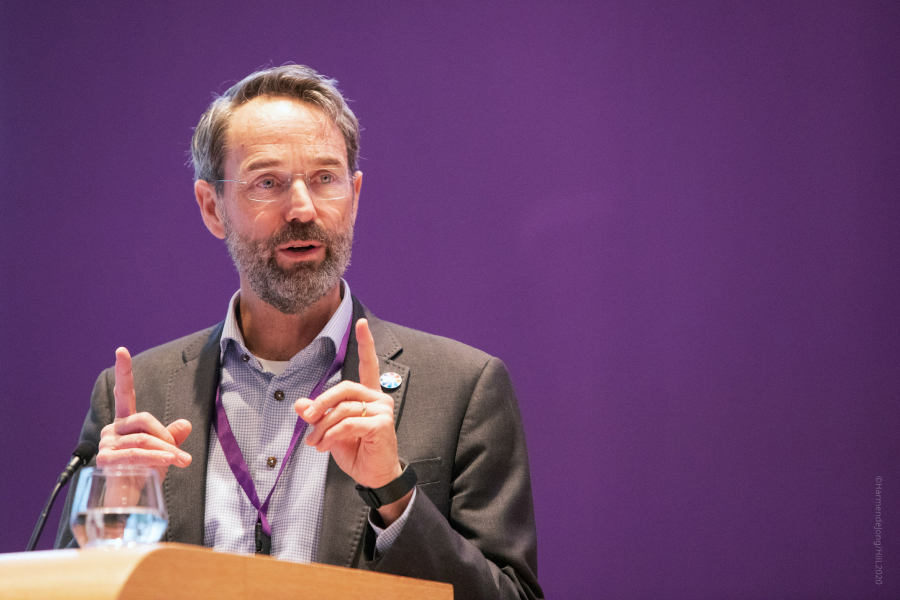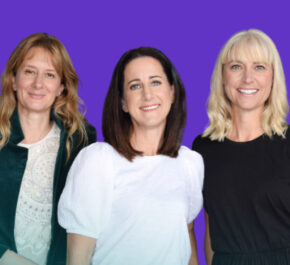“Why must we go to a physical place to be heard? Why do they need our details and signatures hundreds of times? ... Why is justice so expensive, so cumbersome? ”– Sam Muller, founder and CEO of the Hague Institute for Innovation of Law
Interview with Dr Sam Muller, founder and CEO of HiiL
Each month, we sit down with one of our heroes from the world of legal innovation.
This time it’s Dr Sam Muller, a global trailblazer of justice innovation.
Sam founded the Hague Institute for Innovation of Law (HiiL) after working as a legal adviser for the United Nations in the Middle East and the Yugoslav Tribunal, and after having led the startup team for the International Criminal Court (ICC).
HiiL, which celebrates its 15th anniversary this year, works with justice entrepreneurs, ministries, and legal organisations around the world to deliver user-friendly justice.
Tell us about your career before HiiL. How did it lead to where you are today?
I was really lucky to have been able to see so much rule of law and justice delivery in so many places, including difficult ones, like Gaza and conflict areas such as Kosovo and Congo. I saw people who had lost everything, who had not been protected by justice and who could not invoke it. I reached a moment where I thought, ‘are we really doing this the right way? There’s got to be a better way we can do this!’.
The ICC talked a lot about the big, bad people we were going after. And they needed to be investigated, don’t get me wrong. But, often, when you talked to the victims, what you heard was, “my cow got stolen”, “I want to go back to my house”, “my husband has left us”. These are the justice problems of ordinary people, and they weren’t being addressed. I wanted to do something about that.

Dr Sam Muller at the Innovating Justice Forum 2020
I also always had the idea of setting something up myself, and when some opportunities came up for funding, I thought – if I don’t do it now, I’ll never do it.
HiiL’s mission is to deliver user-friendly justice. What is that?
I’ll answer this with a story. I bought a pair of headphones online and after a few weeks, one of the earpods didn’t work.
So, I found the email where I bought the headphones, and a few clicks later I had an online conversation with the store, who told me I could go to the supermarket down the road, scan a mobile code, and get an envelope to send back the headphones. When I sent the headphones, I received an SMS saying ‘thank you, we’ve received your return’, and a few days later, I got a new pair in the mail. To me, that is user-friendly justice.
This happened to me 3 times for the same headphones, so the headphones weren’t very good. But the process was user-friendly.
To this day, I don’t understand why a similar kind of experience is not possible when you have trouble with your landlord or when you don’t understand your labor contract.
Why must we go to a physical place to be heard? Why do they need our details and signatures hundreds of times? Why isn’t there an easy-access call center to guide us through what this means, and what I can and can’t do? Why is justice so expensive, so cumbersome?
User-friendly justice is about something being affordable, accessible, and understandable. And most of the law is none of these things.
Tell us a bit more about your vision for the future.
There are 5.1 billion people in the world who don’t have adequate access to justice. That’s massive. You probably can’t say that around two-thirds of the world is bereft of good education or good health.
Our mission at HiiL is to empower 150 million people to prevent and resolve the most pressing justice problems by 2030.
Our data shows that in an average country, a maximum of 8% of disputes end up before courts and lawyers. The rest are all solved elsewhere. And yet most of the attention about access to justice is focused on courts and lawyers. And there is very little attention for the prevention of legal problems.
Sauti (Kenya) empowers cross-border traders in East Africa to exercise their rights. HiiL's Justice Accelerator has supported over 50 justice innovations, like Sauti, since 2012.
How do you plan to achieve this ambitious target?
There are a few different parts to this.
The first is data.
If you look at access to health in the last 40 years, it’s gone up significantly and steadily. If you look at access to education, it’s the same story.
Is access to health or education perfect? No. But data allows you to know what’s going on, then to prioritise your resources, and then to know whether you’re doing what you set out to do – setting an evidence and outcome based target. So we need to collect a lot of data about the needs and experiences of people who have justice problems.
The second part is innovation.
There are many good lawyers and judges doing incredible work, but we can all do more to close the justice gap and make access mainstream. We simply cannot continue with the model of justice invented in the 1800s that we still use today in many parts of the world.
Even today, the legal and justice sector is almost entirely constituted of lawyers and the public sector. At HiiL, we set up the Justice Accelerator to introduce the idea of justice entrepreneurship. We use technology and behavioural economics. We bring in psychologists, UX designers, and technology specialists.
“Innovation cannot just come from the public sector – it requires entrepreneurship, PPPs, and a different way of leading and thinking.”– Sam Muller, founder and CEO of the Hague Institute for Innovation of Law
Innovation cannot just come from the public sector – it requires entrepreneurship, PPPs (public private partnerships), and a different way of leading and thinking.
Right now, when there’s a need to innovate and find a new vaccine, the effort to innovate comes from coalitions and interesting collaborations between the private and public sectors. I think we can learn a lot from the health sector.
And finally, the third and last part is transformation.
Things are not going to change if we only have data or innovation. The big game changer is in people’s mindsets and our regulatory models.
In most countries, the legal market is heavily protected. If you’re not a qualified lawyer, then it can be considered illegal to provide easily accessible advice for even simple legal issues. So, we work with leaders from the justice sector to create conditions that allow justice innovation to thrive.
What are your views on the role of technology?
I think it’s important that we don’t become utopian about technology and think it’s the solution for everything. I sometimes feel this happens a little bit.
In the end, why am I happy with Amazon? Is because it was a human experience for me. Yes, it was supported by technology, but I hardly noticed it. What I noticed is the human interaction, I felt listened to, I felt helped. That’s what counts.
How has COVID-19 impacted the global justice system, or access to justice?
The demand for justice is increasing in different ways. We have done a lot of research into that over the past months and continue to collect data on justice needs. There are increases in domestic violence, unemployment, wills and estates, and divorces. But this is happening at a time where the ability of the justice sector to deliver is actually going down.

According to Sam, the innovation agenda is becoming more important to the global justice system as a result of COVID-19.
People are protesting. They feel that the measures being taken are capricious or that the burden of the economic downturn isn’t being shared evenly. When the economy restarts you need a good legal system to curb crime and ensure legal certainty to get contracts enforced. If we don’t ensure that access to justice is an integral part of the response to the pandemic, we will face a very serious crisis of justice.
At the same time, we see slow shifts accelerating. The move to online courts is suddenly going much faster. Many are starting to see that they can’t continue with business as usual. We have to do more with less so the innovation agenda is becoming more important than ever.
One more question: what’s your favourite place to relax?
My favourite place to relax would be up on a mountain.
Which mountain?
Any mountain. It’s a bit of a challenge for a Dutchie living in a flat country. I usually go to France or Switzerland, which is an 8-hour drive, which I think for you Australians, is peanuts.
If you’re interested in learning how Josef works to make the law more accessible, reach out to our team.


